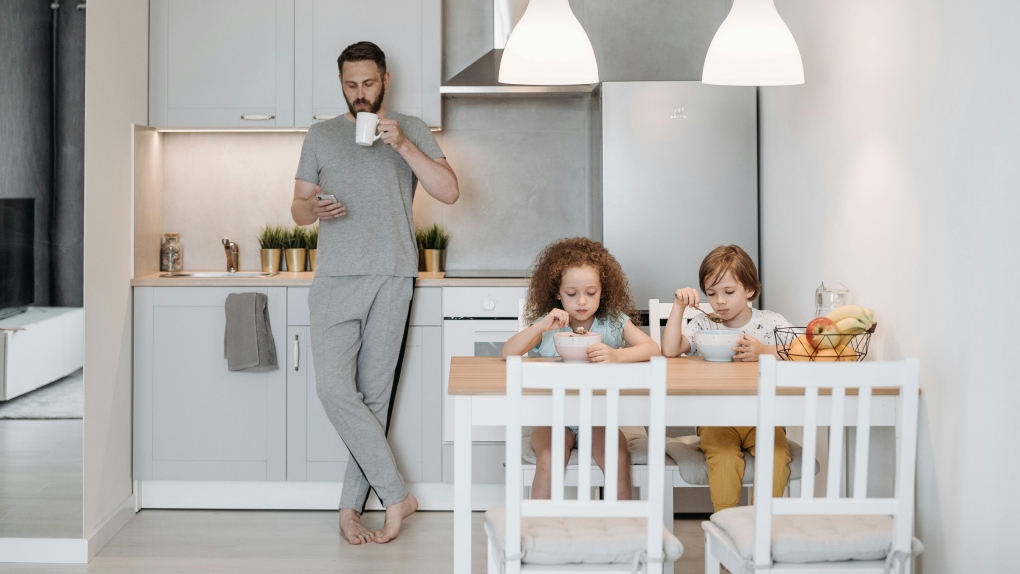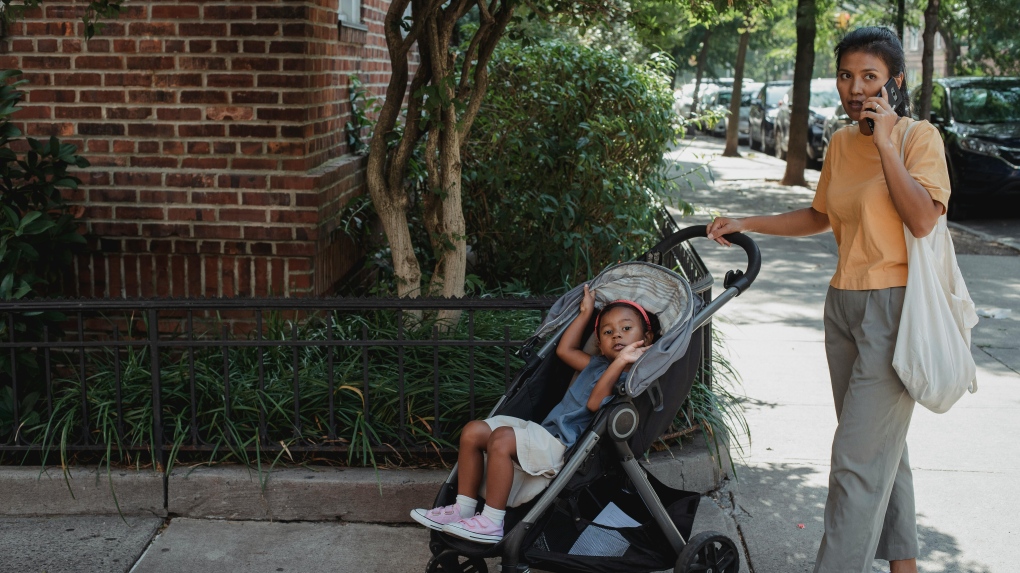This type of screen time has the worst effect on kids: experts
The research on children's screen time is pretty conclusive: less is more.
However, according to some experts, there is one type of screen time that is continuously excessive, and it's having a severe effect on our children: parents' screen time.
Experts say when it comes to a child’s development, parents should spend less time worrying about their kids’ screen time -- and focus more on reducing theirs.
"When you have a parent who is disengaged and not giving the children that attention, it does have a very negative impact on their development," explains Dr. Victoria Talwar, Canada research chair in the Department of Educational and Counseling Psychology at McGill University. "They need to be able to explore their world and learn about it and engage with their environment in a hands-on way."
She says parents have a strong hand in developing their children's early language, cognitive and emotional self-regulation capabilities.
"If we're distracted and not paying attention to them, they're not getting that conversational input with us, which is really important for their development of understanding the world," Talwar states.
Dr. William Bukowski, a professor of psychology at Concordia University, acknowledges that parenting is a tightrope-like balancing act.
"You don't want to be too invasive. You don't want to be intrusive," he notes. "No one wants to be the helicopter parent, at least I don't think anyone wants to be."
All the same, he points out that parents are a primary source of guidance and support, whether it be helping a child prepare for a test or teaching them to identify and manage their emotions.
"The idea that screen time might disrupt that is that the more time you spend doing one thing, the less time you spend doing something else," he explains. "Sometimes when you're dealing with screen time, you end up closing the screen, but still thinking about whatever it was that you just happened to see."
 A father on his phone as his children eat breakfast. (Pavel Danilyuk/pexels.com)
A father on his phone as his children eat breakfast. (Pavel Danilyuk/pexels.com)
Half-hearted attention
The biggest issue surrounding parents' screen time?
Tuned-out parents who are continuously giving their kids half-hearted attention as they doom-scroll TikTok or Instagram.
"Are you present in the relationship or are you not present in the relationship?" Bukowski asks. "Sometimes, your presence is needed more than it is at other times, and if at that moment, you're distracted by something, then it's a lost opportunity. It also might inform someone about how important am I to that person. Am I less important than the screen?"
He points out a parent's main role is to be in their child's zone of proximal development, a concept in educational psychology that represents the space between what a person is capable of doing alone and what they struggle to do even with support.
"I think that many moments in parenting are the golden moments when suddenly you see the need to be inside your child's zone of proximal development where they suddenly need 30 seconds of scaffolding that's going to help them get past something," Bukowski tells CTV News. "The more you're distracted by some other things, which is the way things are sometimes, the less time you have to be attentive to that moment when you're needed."
Talwar adds that researchers have found that parents can spend up to 30 per cent of their time looking at their phones while at the playground with their kids.
"During that time, there's a much higher likelihood of children doing things like tumbling off the slides or falling off swings," she said. "It also means that we're not paying attention or engaging with our children, and a key way that children learn is through engaging with their environment, including us, and that's important for them."
 A mother on her phone as she takes a walk with her child. (Kamaji Ogino/pexels.com)
A mother on her phone as she takes a walk with her child. (Kamaji Ogino/pexels.com)
Practice what you preach
Talwar points out children are sponges and will usually follow their parents' lead.
"I've seen parents who complain, for instance, about their older children's use of their smartphones," she recalls. "But the same parents, as they were speaking to me, can be interrupted in our conversation to look at their phone."
Simply put, if we want our kids to put down their screens, we have to practice what we preach.
"We have to think about what we're telling our children and what we're actually modelling: are we also doing the thing that we don't like them to do when we're talking to them?" Talwar asks. "We also have to become more mindful of what we're doing."
The professors stress this doesn't mean parents should feel guilty about having their phones on them or occasionally looking at them but, as with most things, moderation is key.
"We need to sometimes put the phone away and say, 'This is a time I'm spending with my child,'" said Talwar. "There's a lot of research to say one of the most significant things you can do is making mealtime a time where the family engages with each other. That's really great for children and really has a stabilizing effect."
The key, concludes Talwar, is quality over quantity.
"It's really important that they have that quality interaction where they feel that they have your attention," she said. "Children are hardwired to engage with us, and if you're not attending to them, they'll keep on at you, trying to get your attention...and one of the ways for them to stop doing that is actually to give them some good quality attention."
CTVNews.ca Top Stories

'We can live our lives again without worrying': Ontario man relieved after insurance company agrees to pay $620,000 hospital bill
An Ontario man who received a $620,000 medical bill from a Florida hospital is now relieved that his insurance company has reversed its decision and decided to pay the bill.
Mark Carney tells Jon Stewart the Liberal party has 'a chance' after Trudeau's resignation
Days ahead of his expected Liberal leadership campaign launch, former Bank of Canada and Bank of England governor Mark Carney says Prime Minister Justin Trudeau's decision to step down boosts the party's chance in the next general election.
'It's not going to be good': Ford says Trump's tariffs could cost Ontario 500,000 jobs
Premier Doug Ford says U.S. president-elect Donald Trump’s promised tariffs on Canadian goods could result in the loss of 500,000 jobs in Ontario, creating the need for billions of dollars in stimulus spending.
Curler Briane Harris not at fault for anti-doping rule violation, provisional ban lifted
Canadian curler Briane Harris is eligible to return to the sport after an absence of nearly one year.
Calgary homeowner faces challenge after property assessment jumps 60%
Stan Valant, a long-time resident of Calgary's Silver Springs, is baffled by the city's recent assessment of his bi-level home.
Harm reduction advocates hope high court will 'clarify' Canada's 'Good Samaritan' law
Canada's Good Samaritan law, which is meant to shield people from arrest after they seek help for someone in medical distress, is under spotlight in the Supreme Court of Canada.
Michelle Obama will not attend Trump's inauguration
Former first lady Michelle Obama will skip the inauguration of president-elect Donald Trump, the second time in two weeks that she is not attending a gathering of former U.S. leaders and their spouses.
Why is Spain considering a 100 per cent tax on homes bought by non-EU residents?
Spain is planning a raft of measures to address its brewing housing crisis, including an up to 100% tax on properties bought by non-European Union residents.
Hamas has accepted a draft agreement for a Gaza ceasefire and the release of hostages, officials say
Hamas has accepted a draft agreement for a ceasefire in the Gaza Strip and the release of dozens of hostages, two officials involved in the talks said Tuesday. Mediator Qatar said Israel and the Palestinian militant group were at the "closest point" yet to sealing a deal that would bring them a step closer to ending the war.

































